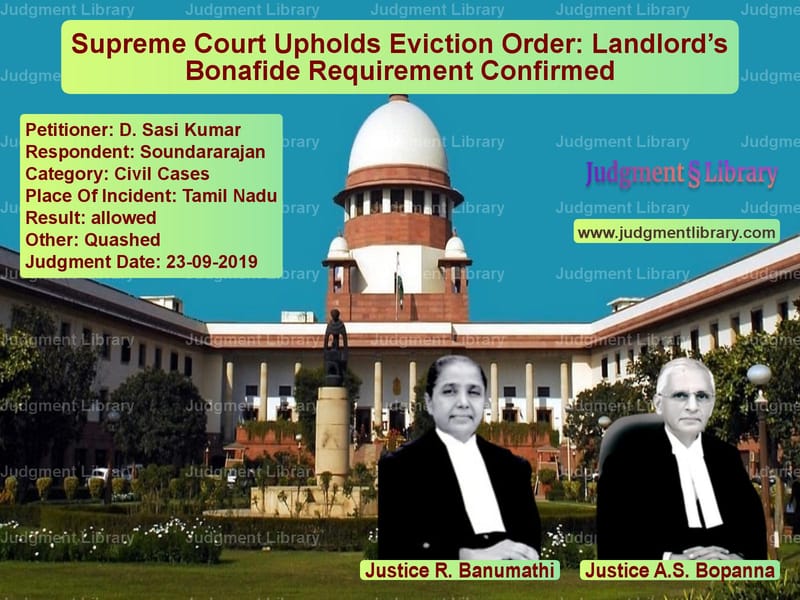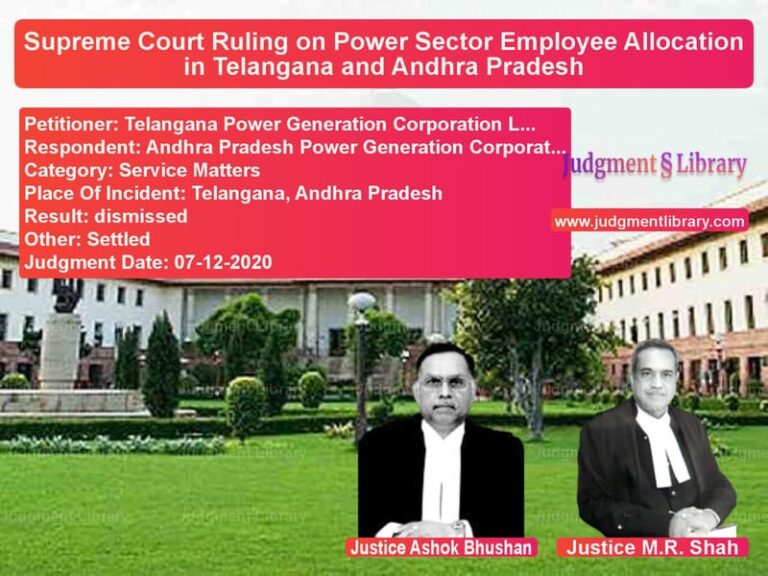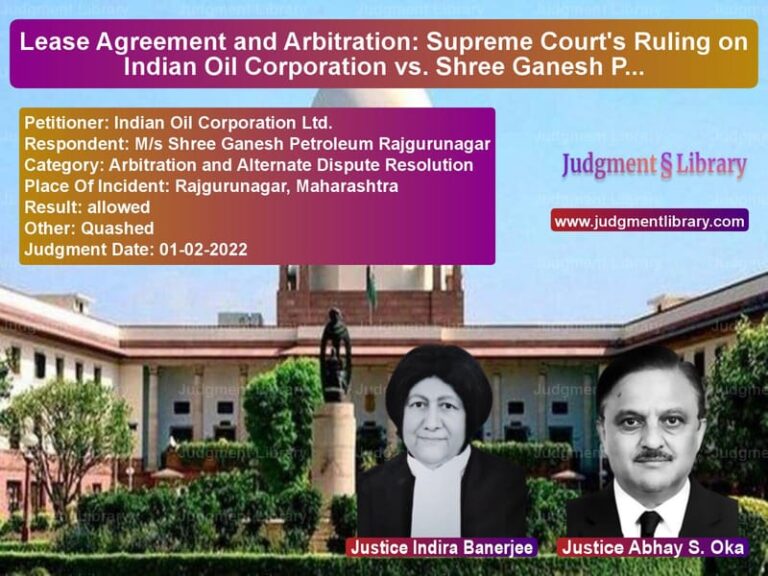Supreme Court Upholds Eviction Order: Landlord’s Bonafide Requirement Confirmed
The Supreme Court of India recently ruled on a significant case involving landlord-tenant disputes under the Tamil Nadu Buildings (Lease and Rent Control) Act, 1960. The case, D. Sasi Kumar v. Soundararajan, examined whether a landlord’s claim of bonafide requirement for a non-residential premise was valid and whether the High Court erred in interfering with the concurrent findings of the lower courts.
Background of the Case
The dispute arose when D. Sasi Kumar (the landlord) filed an eviction petition against Soundararajan (the tenant) under Sections 10(3)(a)(iii) and 14(1)(b) of the Tamil Nadu Buildings (Lease and Rent Control) Act, 1960. The landlord sought eviction on the grounds that he required the premises for personal use to start a garment business and that the building required demolition and reconstruction.
The Rent Controller allowed the eviction, and the Appellate Authority upheld the decision. However, the High Court reversed the lower courts’ concurrent findings, ruling that the landlord’s claim was not sufficiently established. Aggrieved by this, the landlord approached the Supreme Court.
Arguments of the Appellant (Landlord)
The appellant’s counsel argued the following points:
- The landlord had demonstrated a genuine and bonafide need for the premises for starting a garment shop.
- The tenant had alternative premises available, which he admitted in cross-examination.
- The High Court overstepped its revisional jurisdiction under Article 227 of the Constitution by re-evaluating the evidence and substituting its own view for the concurrent findings of the Rent Controller and Appellate Authority.
- The tenant’s refusal to vacate the premises was solely to continue benefiting from low rent, which was not a valid ground to deny the landlord’s right.
Arguments of the Respondent (Tenant)
The tenant’s counsel countered with the following arguments:
- The landlord’s claim was not sufficiently proven, as he failed to provide evidence of financial capability to start the garment shop.
- There was no immediate demolition plan, and the requirement to demolish the premises was not demonstrated through approved construction plans.
- The tenant had been in possession for a long time, and eviction would cause him significant hardship.
- The High Court correctly assessed that the landlord had not demonstrated continuous bonafide requirement from the date of filing the petition to the final adjudication.
Supreme Court’s Analysis
1. Limited Scope of Revisional Jurisdiction
The Supreme Court reaffirmed that the High Court’s power under Article 227 is limited to correcting jurisdictional errors and cannot be used to reassess evidence and substitute factual findings of the lower courts.
“The High Court, in exercise of its revisional jurisdiction, cannot act as an appellate court and reassess the entire evidence as if sitting in appeal.”
2. Landlord’s Bonafide Requirement
The Court emphasized that the landlord’s bonafide requirement had been established by the concurrent findings of the Rent Controller and Appellate Authority.
“If a landlord establishes that he requires the premises for a bonafide personal occupation, that need cannot be negated merely because the tenant suggests an alternate motive.”
3. Hardship Consideration
The Court considered the balance of hardship and found that the tenant had alternative premises and that denying eviction would unfairly restrict the landlord’s right to use his own property.
“The tenant’s admission that he owns two other business premises indicates that no undue hardship will be caused by eviction.”
4. Eviction Based on Demolition and Reconstruction
Regarding the landlord’s claim under Section 14(1)(b), the Court noted that although an approved building plan was not provided, the requirement for the premises could still be established for bonafide use.
“Where a landlord seeks eviction both for bonafide use and for reconstruction, the court should not impose an unreasonable burden of proof beyond the statute’s intent.”
Final Judgment
The Supreme Court ruled in favor of the appellant, setting aside the High Court’s order and restoring the eviction order passed by the Rent Controller and upheld by the Appellate Authority.
“The landlord has successfully established bonafide need, and the High Court erred in interfering with the concurrent factual findings of the lower courts.”
The Court granted the tenant time until January 31, 2021, to vacate the premises, subject to filing an undertaking to voluntarily vacate and pay rent without default.
Implications of the Judgment
This ruling has significant implications for landlord-tenant disputes in India. Key takeaways include:
- The High Court’s power under Article 227 must be exercised cautiously and should not involve reassessing evidence like an appellate court.
- Bonafide requirement by a landlord should not be doubted merely based on hypothetical concerns raised by the tenant.
- Eviction laws must balance the rights of landlords and tenants, ensuring that landlords are not unfairly denied use of their own property.
- Delay in judicial proceedings should not be used as a ground to reject eviction when bonafide need existed at the time of filing the petition.
The Supreme Court’s decision ensures that property owners’ rights are upheld while also maintaining fairness in landlord-tenant relations.
Petitioner Name: D. Sasi Kumar.Respondent Name: Soundararajan.Judgment By: Justice R. Banumathi, Justice A.S. Bopanna.Place Of Incident: Tamil Nadu.Judgment Date: 23-09-2019.
Don’t miss out on the full details! Download the complete judgment in PDF format below and gain valuable insights instantly!
Download Judgment: D. Sasi Kumar vs Soundararajan Supreme Court of India Judgment Dated 23-09-2019.pdf
Direct Downlaod Judgment: Direct downlaod this Judgment
See all petitions in Property Disputes
See all petitions in Landlord-Tenant Disputes
See all petitions in Judgment by R. Banumathi
See all petitions in Judgment by A. S. Bopanna
See all petitions in allowed
See all petitions in Quashed
See all petitions in supreme court of India judgments September 2019
See all petitions in 2019 judgments
See all posts in Civil Cases Category
See all allowed petitions in Civil Cases Category
See all Dismissed petitions in Civil Cases Category
See all partially allowed petitions in Civil Cases Category







